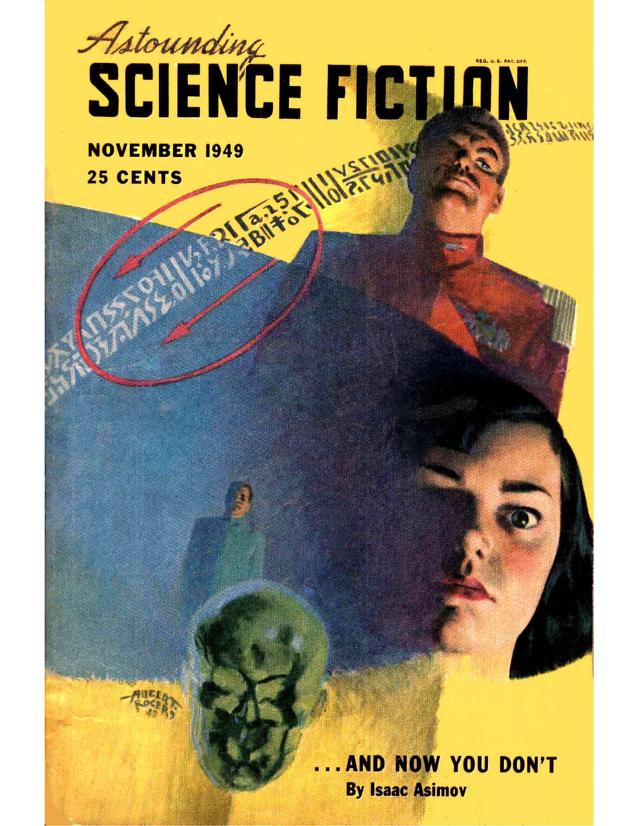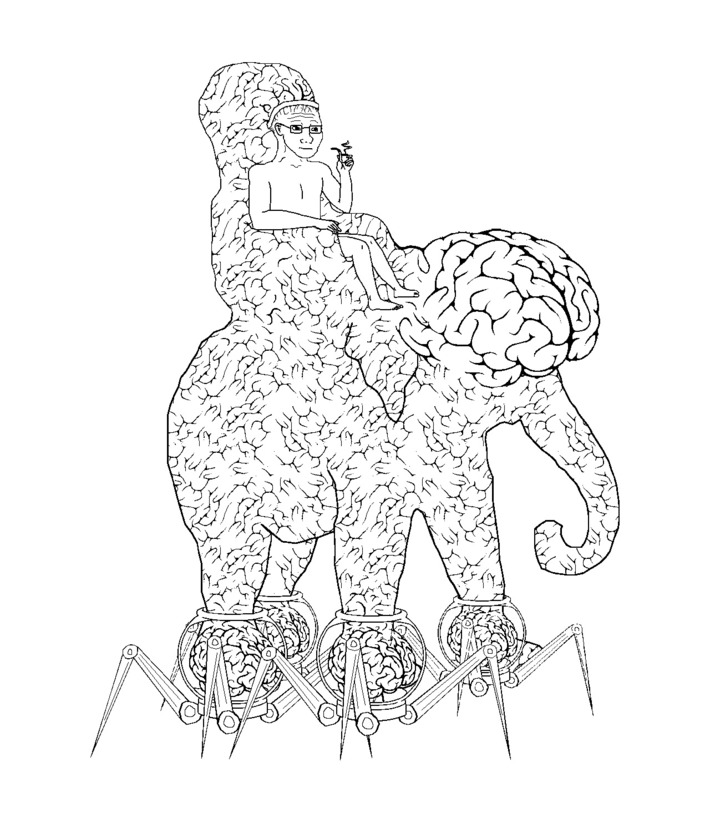Short Reviews – …And Now You Don’t (Part 1 of 3), by Isaac Asimov
Friday , 6, July 2018 Uncategorized 5 Comments…And Now You Don’t, by Isaac Asimov, was serialized in three parts beginning with the November 1949 issue of Astounding. It was later anthologized as the second half of the book “Second Foundation”. It can be read here at Archive.org.

It is exactly as exciting as it looks.
This is it, guys! One of the touchstone sagas of Campbell’s Astounding and the Golden Age of Science Fiction. A hallmark series of one of the Big Three of Science Fiction: Isaac Asimov’s Foundation!
And, oh my god, this is boring as crap!
40-odd pages of the first installment of “…And Now You Don’t”, and nothing happens!
Chapter 1: A girl writes a term paper on the Seldon Plan.
Chapter 2: Two telepathic egg-heads from the Second Foundation have a conversation about the Seldon Plan.
Chapter 3: Five non-telepathic egg-heads have a conversation about the Seldon Plan and the possible existence of and interference by a Second Foundation.
Chapter 4: Having done some math during chapter 3 when the First Foundation egg-heads were talking, the Second Foundation egg-heads have a conversation about the results of the aforementioned equations and their bearing on the Seldon Plan.
Chapter 5: After further discussion, it is determined that the stuttering Stanley of First Foundation egg-heads will go off to the Mule’s world and look into possible Second Foundation interference with the First Foundation under false pretenses. The girl from chapter one, however, had been spying in on daddy’s plans to save the once-and-future galactic empire and stowed away on the dork’s space-ship.
To be continued!

Depicted: The Second Foundation
For those who don’t know, Foundation was Asimov’s chronicles of a galactic empire, particularly the period between the first and second (think the conflict period between the early and latter Han, only in space, over several centuries, and apparently very boring). Hari Seldon had a master plan to ensure that the period between the collapse of one galactic empire and the resurrection of a second empire was only a matter of a single millennia rather than 30-odd millennia.
A very simplified version is the First Foundation would work hard works while a Second Foundation would think hard thinks, and eventually, the thinky men of the Second Foundation would be able to step in and be the psycho-science think masters of the new galactic empire the First Foundation had built and maintained the framework for. Unfortunately, it would be disaster if the First Foundation found out about the Second Foundation or develop advanced thinky-thinks for themselves, because then the First Foundation might get lazy or something.
The teenage girl writing a term paper on the previous serials was seriously not the worst way to catch readers up on the backstory, and had the space and verbiage been significantly less between her recap interrupted by a mysterious stranger showing up to talk to her father about the Second Foundation and her sneaking onto a space ship to go investigate the mystery, there might be a worthwhile story that could be told here. But lord all mighty, this was slow as chunks! And the guy who’s set up to be the point-man for the adventure with the gal is such a loser that he’s barely even a character until the last chapter of the installment! The mysterious stranger who came in through the girl’s window is just there to deliver the message; after the egg-heads’ conversation about what needs to be done re: the Second Foundation, will he even be important anymore? Who knows!?
As an editor myself, I DO see the potential in this story, but John W. Campbell was not the sort of dude who would say “Maybe three chapters of people sitting around talking is a bit much between the chapter introducing the heroine and the heroine going off unto adventure…” to rein a brother in.
I’ll maintain what I’ve said in the past about Asimov—I absolutely love every piece of non-fiction I’ve read by him. He was a smart man and a talented essayist with a knack for making scientific concepts accessible to the curious layperson. But he is also probably one of the worst fiction writers I have ever read.
In case somebody missed by previous declarations: Not An Asimov Fan.
That said, I kinda liked a few stories in his I, ROBOT collection. Even those are still glorified word problems.
His short stories were better. Maybe because he didn’t have time for thinky-thinks.
Nice phrase, by the way. And, for the subject at hand, painfully a propos.
I’m a big fan of Asimov’s. I will grant you that some of his stories are a little heady but most of them don’t preach at you like the SJW Writers do. Now I’ve only read his Short Stories as I can only write Short Fiction; so you could be completely right about his novels. I know most people here are Red Readers but if you like great though action-less Blue Sci-fi try “The Last Question”.
I did like the first 1.5 books of the Foundation trilogy. A nice future rendition of Decline and Fall and possible renewal. Trouble was, as a hard scientist himself with frankly a rather limited imagination, he couldn’t deal with the mental powers of the mule or the Second Foundation in a convincing way. He never showed what their exact powers or limitations were and it made Second Foundation and the latter half of Foundation and Empire rather pointless. Anything could have happened and been quite as convincing.
I concur with the comments on Asimov’s writing. Novels OK at best but contained interesting concepts. His short stories were good, occasionally great, and his science and math writing helped create my lifelong love of those topics.